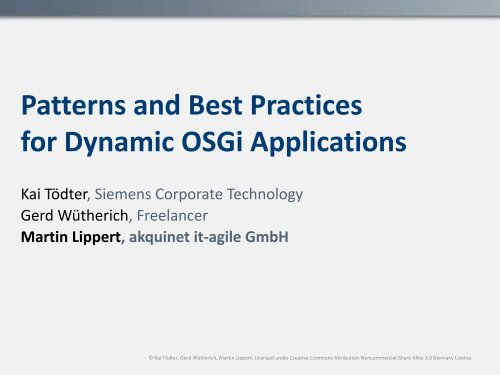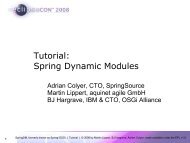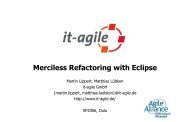Patterns and Best Practices for Dynamic OSGi ... - Martin Lippert
Patterns and Best Practices for Dynamic OSGi ... - Martin Lippert
Patterns and Best Practices for Dynamic OSGi ... - Martin Lippert
You also want an ePaper? Increase the reach of your titles
YUMPU automatically turns print PDFs into web optimized ePapers that Google loves.
<strong>Patterns</strong> <strong>and</strong> <strong>Best</strong> <strong>Practices</strong><br />
<strong>for</strong> <strong>Dynamic</strong> <strong>OSGi</strong> Applications<br />
Kai Tödter, Siemens Corporate Technology<br />
Gerd Wütherich, Freelancer<br />
<strong>Martin</strong> <strong>Lippert</strong>, akquinet it-agile GmbH<br />
© Kai Tödter, Gerd Wütherich, <strong>Martin</strong> <strong>Lippert</strong>; Licensed under Creative Commons Attribution-Noncommercial-Share Alike 3.0 Germany License
Agenda<br />
» <strong>Dynamic</strong> <strong>OSGi</strong> applications<br />
» Basics<br />
» Package dependencies<br />
» Service dependencies<br />
» <strong>OSGi</strong> Design Techniques<br />
» The Whiteboard Pattern<br />
» The Extender Pattern<br />
» Conclusion<br />
2<br />
© Kai Tödter, Gerd Wütherich, <strong>Martin</strong> <strong>Lippert</strong>; Licensed under Creative Commons Attribution-Noncommercial-Share Alike 3.0 Germany License
"Classic" Java applications<br />
Java St<strong>and</strong>ard Edition:<br />
» Linear global class path<br />
» Only one version of every library per application<br />
» No component nor module concept above the classes level<br />
» Totally different deployment models <strong>for</strong> different kind of<br />
environments<br />
Java Enterprise Edition:<br />
» Hot deployment possible, but requires special deployment<br />
types (e.g. WARs, RARs, EARs)<br />
3<br />
© Kai Tödter, Gerd Wütherich, <strong>Martin</strong> <strong>Lippert</strong>; Licensed under Creative Commons Attribution-Noncommercial-Share Alike 3.0 Germany License
And the result is…<br />
4<br />
© Kai Tödter, Gerd Wütherich, <strong>Martin</strong> <strong>Lippert</strong>; Licensed under Creative Commons Attribution-Noncommercial-Share Alike 3.0 Germany License
Now we have <strong>OSGi</strong><br />
» “<strong>OSGi</strong> - the dynamic module system <strong>for</strong> Java”<br />
» You can define:<br />
» Bundles (aka Modules)<br />
» Dependencies<br />
» Visibilities<br />
» This is a huge step <strong>for</strong>ward !!!<br />
5<br />
© Kai Tödter, Gerd Wütherich, <strong>Martin</strong> <strong>Lippert</strong>; Licensed under Creative Commons Attribution-Noncommercial-Share Alike 3.0 Germany License
And <strong>OSGi</strong> is dynamic!<br />
6<br />
© Kai Tödter, Gerd Wütherich, <strong>Martin</strong> <strong>Lippert</strong>; Licensed under Creative Commons Attribution-Noncommercial-Share Alike 3.0 Germany License
<strong>Dynamic</strong> Swing <strong>OSGi</strong> Demo<br />
7<br />
© Kai Tödter, Gerd Wütherich, <strong>Martin</strong> <strong>Lippert</strong>; Licensed under Creative Commons Attribution-Noncommercial-Share Alike 3.0 Germany License
How to get the Demo?<br />
» The PM Demo project home page is:<br />
http://max-server.myftp.org/trac/pm<br />
» There you find<br />
» Wiki with some documentation<br />
» Anonymous Subversion access<br />
» Trac issue tracking<br />
» Licenses<br />
» All PM project sources are licensed under EPL<br />
» Swing Application Framework (JSR 296) implementation is licensed<br />
under LGPL<br />
» Swing Worker is licensed under LGPL<br />
» The nice icons from FamFamFam are licensed under the Creative<br />
Commons Attribution 2.5 License.<br />
8<br />
© Kai Tödter, Gerd Wütherich, <strong>Martin</strong> <strong>Lippert</strong>; Licensed under Creative Commons Attribution-Noncommercial-Share Alike 3.0 Germany License
The first impressions<br />
» "Wow - <strong>OSGi</strong> does dynamic install, uninstall <strong>and</strong> update of<br />
bundles, this is cool…"<br />
» I don’t need to take care of dynamics anymore<br />
» I don’t need to think about this at all<br />
» Everything is done automatically under the hood<br />
» Objects are changed/migrated <strong>and</strong> references to objects are managed<br />
all automatically<br />
» Huge bulk of magic<br />
» This is all wrong!!!<br />
9<br />
© Kai Tödter, Gerd Wütherich, <strong>Martin</strong> <strong>Lippert</strong>; Licensed under Creative Commons Attribution-Noncommercial-Share Alike 3.0 Germany License
If its all magic, why this?<br />
10<br />
© Kai Tödter, Gerd Wütherich, <strong>Martin</strong> <strong>Lippert</strong>; Licensed under Creative Commons Attribution-Noncommercial-Share Alike 3.0 Germany License
The basic idea<br />
» <strong>OSGi</strong> controls the lifecycle of bundles<br />
» It allows you to install, uninstall <strong>and</strong> update bundles at runtime<br />
» It gives you feedback on all those actions<br />
» But it does not change any objects or references <strong>for</strong> you<br />
» "No magic"<br />
» <strong>OSGi</strong> gives you the power to implement dynamic applications<br />
» How you use this power is up to you<br />
11<br />
© Kai Tödter, Gerd Wütherich, <strong>Martin</strong> <strong>Lippert</strong>; Licensed under Creative Commons Attribution-Noncommercial-Share Alike 3.0 Germany License
What is the challenge?<br />
» Bundles have dependencies, e.g. package or service<br />
dependencies<br />
» Dependencies have to be h<strong>and</strong>led with respect to the dynamic<br />
behavior!<br />
12<br />
© Kai Tödter, Gerd Wütherich, <strong>Martin</strong> <strong>Lippert</strong>; Licensed under Creative Commons Attribution-Noncommercial-Share Alike 3.0 Germany License
Agenda<br />
» <strong>Dynamic</strong> <strong>OSGi</strong> applications<br />
» Basics<br />
» Package dependencies<br />
» Service dependencies<br />
» <strong>OSGi</strong> Design Techniques<br />
» The Whiteboard Pattern<br />
» The Extender Pattern<br />
» Conclusion<br />
13<br />
© Kai Tödter, Gerd Wütherich, <strong>Martin</strong> <strong>Lippert</strong>; Licensed under Creative Commons Attribution-Noncommercial-Share Alike 3.0 Germany License
System overview<br />
14<br />
© Kai Tödter, Gerd Wütherich, <strong>Martin</strong> <strong>Lippert</strong>; Licensed under Creative Commons Attribution-Noncommercial-Share Alike 3.0 Germany License
Package Dependencies<br />
» Export of packages with Export-Package<br />
» Import of packages via Import-Package or Require-Bundle<br />
15<br />
© Kai Tödter, Gerd Wütherich, <strong>Martin</strong> <strong>Lippert</strong>; Licensed under Creative Commons Attribution-Noncommercial-Share Alike 3.0 Germany License
Digression: Bundle-Lifecycle<br />
16<br />
© Kai Tödter, Gerd Wütherich, <strong>Martin</strong> <strong>Lippert</strong>; Licensed under Creative Commons Attribution-Noncommercial-Share Alike 3.0 Germany License
Installing<br />
» Makes a Bundle persistently available in the <strong>OSGi</strong> Framework<br />
» The Bundle is assigned a unique Bundle identifier (long)<br />
» The Bundle State is set to INSTALLED<br />
» The Bundle will remain in the <strong>OSGi</strong> Framework until explicitly<br />
uninstalled<br />
17<br />
© Kai Tödter, Gerd Wütherich, <strong>Martin</strong> <strong>Lippert</strong>; Licensed under Creative Commons Attribution-Noncommercial-Share Alike 3.0 Germany License
Resolving<br />
» Wires bundles by matching imports to exports<br />
» Resolving may occur eagerly (after installation) or lazily<br />
» There is no API <strong>for</strong> resolving<br />
» After resolving -> Bundle is in state RESOLVED<br />
18<br />
© Kai Tödter, Gerd Wütherich, <strong>Martin</strong> <strong>Lippert</strong>; Licensed under Creative Commons Attribution-Noncommercial-Share Alike 3.0 Germany License
Uninstall<br />
» … removes a Bundle from the <strong>OSGi</strong> Framework<br />
» The Bundle State is set to UNINSTALLED<br />
» If the Bundle is an exporter: Existing wires will remain until<br />
» the importers are refreshed or<br />
» the <strong>OSGi</strong> Framework is restarted<br />
19<br />
© Kai Tödter, Gerd Wütherich, <strong>Martin</strong> <strong>Lippert</strong>; Licensed under Creative Commons Attribution-Noncommercial-Share Alike 3.0 Germany License
Update <strong>and</strong> Refresh<br />
» Update:<br />
» Reads in the Bundle again<br />
» If the Bundle is an exporter: Existing wires will remain until the<br />
importers are refreshed or the <strong>OSGi</strong> Framework is restarted<br />
» Refresh:<br />
» All the bundle dependencies will be resolved again<br />
20<br />
© Kai Tödter, Gerd Wütherich, <strong>Martin</strong> <strong>Lippert</strong>; Licensed under Creative Commons Attribution-Noncommercial-Share Alike 3.0 Germany License
What does this mean?<br />
» Update or uninstall of bundles can lead to stale package<br />
references<br />
» Refresh -> restart of the bundles<br />
21<br />
© Kai Tödter, Gerd Wütherich, <strong>Martin</strong> <strong>Lippert</strong>; Licensed under Creative Commons Attribution-Noncommercial-Share Alike 3.0 Germany License
We need to re-think designs<br />
» Just modularizing into bundles with clearly defined package<br />
dependencies is not enough!<br />
» We need to think about dynamics while building the system<br />
» We need to think even more about dependencies<br />
» We need to re-think typical well-known designs<br />
» More will follow<br />
22<br />
© Kai Tödter, Gerd Wütherich, <strong>Martin</strong> <strong>Lippert</strong>; Licensed under Creative Commons Attribution-Noncommercial-Share Alike 3.0 Germany License
<strong>Best</strong> <strong>Practices</strong>: Package Dependencies<br />
» Only import packages that are really used/needed<br />
» Use Import-Package rather Require-Bundle<br />
» Only use Require-Bundle when it comes to split-packages<br />
» This is the un<strong>for</strong>tunately the case in many bundles of the Eclipse<br />
plat<strong>for</strong>m!<br />
» -> Reduce coupling<br />
23<br />
© Kai Tödter, Gerd Wütherich, <strong>Martin</strong> <strong>Lippert</strong>; Licensed under Creative Commons Attribution-Noncommercial-Share Alike 3.0 Germany License
Agenda<br />
» <strong>Dynamic</strong> <strong>OSGi</strong> applications<br />
» Basics<br />
» Package dependencies<br />
» Service dependencies<br />
» <strong>OSGi</strong> Design Techniques<br />
» The Whiteboard Pattern<br />
» The Extender Pattern<br />
» Conclusion<br />
24<br />
© Kai Tödter, Gerd Wütherich, <strong>Martin</strong> <strong>Lippert</strong>; Licensed under Creative Commons Attribution-Noncommercial-Share Alike 3.0 Germany License
Service dependencies<br />
» One way to reduce coupling<br />
» Split interface <strong>and</strong> implementation into different bundles<br />
» Lookup implementation(s) dynamically<br />
25<br />
© Kai Tödter, Gerd Wütherich, <strong>Martin</strong> <strong>Lippert</strong>; Licensed under Creative Commons Attribution-Noncommercial-Share Alike 3.0 Germany License
ServiceListener / ServiceTracker<br />
» But be careful:<br />
» If you lookup a service implementation, you get the direct reference to<br />
that object<br />
» If the implementing bundle goes away, you need to be careful not to<br />
keep this object referenced<br />
» ServiceListener / ServiceTracker help you<br />
» ServiceListener: calls you back if something changes<br />
» ServiceTracker: listens to service listener events <strong>for</strong> you (less code than<br />
using service listeners manually)<br />
26<br />
© Kai Tödter, Gerd Wütherich, <strong>Martin</strong> <strong>Lippert</strong>; Licensed under Creative Commons Attribution-Noncommercial-Share Alike 3.0 Germany License
Declarative (<strong>and</strong> other) Approaches<br />
» Declarative Services<br />
» Part of the <strong>OSGi</strong> specification, declarative description of services with XML<br />
» Spring <strong>Dynamic</strong> Modules<br />
» Spring goes dynamic with help of <strong>OSGi</strong><br />
» http://www.springframework.org/osgi<br />
» iPojo<br />
» “Original” DI framework <strong>for</strong> <strong>OSGi</strong><br />
» http://ipojo.org<br />
» Guice - Peaberry<br />
» Guice: Per<strong>for</strong>mant, lightweight DI Framework<br />
» Peaberry: Extension of Guice <strong>for</strong> <strong>OSGi</strong><br />
» http://code.google.com/p/peaberry/<br />
» http://code.google.com/p/google-guice/<br />
27<br />
© Kai Tödter, Gerd Wütherich, <strong>Martin</strong> <strong>Lippert</strong>; Licensed under Creative Commons Attribution-Noncommercial-Share Alike 3.0 Germany License
<strong>Best</strong> <strong>Practices</strong>: Services<br />
» Use a ServiceTracker<br />
» Don’t do all the service getting manually<br />
» Service tracker help you with dynamically coming <strong>and</strong> going services<br />
» Better: Use declarative approaches!<br />
» Either DS or Spring DM<br />
» Both help you with service dependencies <strong>and</strong> dependency injection<br />
28<br />
© Kai Tödter, Gerd Wütherich, <strong>Martin</strong> <strong>Lippert</strong>; Licensed under Creative Commons Attribution-Noncommercial-Share Alike 3.0 Germany License
Agenda<br />
» <strong>Dynamic</strong> <strong>OSGi</strong> applications<br />
» Basics<br />
» Package dependencies<br />
» Service dependencies<br />
» <strong>OSGi</strong> Design Techniques<br />
» The Whiteboard Pattern<br />
» The Extender Pattern<br />
» Conclusion<br />
29<br />
© Kai Tödter, Gerd Wütherich, <strong>Martin</strong> <strong>Lippert</strong>; Licensed under Creative Commons Attribution-Noncommercial-Share Alike 3.0 Germany License
The Whiteboard-Pattern<br />
» Problem:<br />
Often a service provides an implementation of the<br />
publisher/subscriber design pattern <strong>and</strong> provides methods to<br />
register listeners <strong>for</strong> notifications<br />
» The <strong>OSGi</strong> service model provides a service registry with these<br />
notification mechanisms already!<br />
» So:<br />
» Don’t get a service <strong>and</strong> register as listener<br />
» Be a service yourself <strong>and</strong> register with the <strong>OSGi</strong> service<br />
registry!<br />
30<br />
© Kai Tödter, Gerd Wütherich, <strong>Martin</strong> <strong>Lippert</strong>; Licensed under Creative Commons Attribution-Noncommercial-Share Alike 3.0 Germany License
Example: The Listener Pattern<br />
» Clients use ApplicationService to register view <strong>and</strong> action contributions<br />
» Client is responsible <strong>for</strong> h<strong>and</strong>ling dynamic behavior<br />
31<br />
© Kai Tödter, Gerd Wütherich, <strong>Martin</strong> <strong>Lippert</strong>; Licensed under Creative Commons Attribution-Noncommercial-Share Alike 3.0 Germany License
Example: The Whiteboard Pattern<br />
» Clients register view <strong>and</strong> action contributions as services<br />
» Application manager is responsible <strong>for</strong> h<strong>and</strong>ling dynamic behavior<br />
32<br />
© Kai Tödter, Gerd Wütherich, <strong>Martin</strong> <strong>Lippert</strong>; Licensed under Creative Commons Attribution-Noncommercial-Share Alike 3.0 Germany License
Whiteboard Pattern in PM Demo<br />
» The Action <strong>and</strong> View contribution managers are NOT services<br />
» Instead, they are wrapped in a DS component<br />
» All action <strong>and</strong> view contributions are <strong>OSGi</strong> services <strong>and</strong><br />
implement<br />
» IActionContribution<br />
» IViewContribution<br />
» Take a look at the bundles<br />
» com.siemens.ct.pm.application<br />
» com.siemens.ct.pm.ui.actions.*<br />
» com.siemens.ct.pm.ui.views.*<br />
33<br />
© Kai Tödter, Gerd Wütherich, <strong>Martin</strong> <strong>Lippert</strong>; Licensed under Creative Commons Attribution-Noncommercial-Share Alike 3.0 Germany License
Agenda<br />
» <strong>Dynamic</strong> <strong>OSGi</strong> applications<br />
» Basics<br />
» Package dependencies<br />
» Service dependencies<br />
» <strong>OSGi</strong> Design Techniques<br />
» The Whiteboard Pattern<br />
» The Extender Pattern<br />
» Conclusion<br />
34<br />
© Kai Tödter, Gerd Wütherich, <strong>Martin</strong> <strong>Lippert</strong>; Licensed under Creative Commons Attribution-Noncommercial-Share Alike 3.0 Germany License
The Extender Pattern<br />
» The extender pattern allows bundles to extend the<br />
functionality in a specific domain<br />
» It uses the synchronous bundle listener<br />
» The extender adds a bundle listener to the BundleContext<br />
» The bundle listener overwrites<br />
public void bundleChanged(BundleEvent event)<br />
» Then the listener checks the started bundle <strong>for</strong> a specific<br />
h<strong>and</strong>ler <strong>and</strong> per<strong>for</strong>ms some (domain)specific action<br />
» The extender should also check all already started bundles in<br />
its activator<br />
35<br />
© Kai Tödter, Gerd Wütherich, <strong>Martin</strong> <strong>Lippert</strong>; Licensed under Creative Commons Attribution-Noncommercial-Share Alike 3.0 Germany License
PM Demo Extender: Registering Services<br />
» The following example shows a demo extender<br />
» Implemented in com.siemens.ct.pm.extender<br />
» Registers a bundle listener<br />
» Looks <strong>for</strong> the manifest header "Action-Contribution" in every<br />
bundle<br />
» When found in a started bundle<br />
» Parses the value as class name<br />
» Registers the class as service implementation <strong>for</strong><br />
com.siemens.ct.pm.application.service.IActionContribution<br />
» When found in a stopped bundle<br />
» Unregisters the service<br />
36<br />
© Kai Tödter, Gerd Wütherich, <strong>Martin</strong> <strong>Lippert</strong>; Licensed under Creative Commons Attribution-Noncommercial-Share Alike 3.0 Germany License
Thank you <strong>for</strong> your attention!<br />
» Questions welcome!<br />
» Kai Tödter<br />
» Gerd Wütherich<br />
» <strong>Martin</strong> <strong>Lippert</strong><br />
37<br />
© Kai Tödter, Gerd Wütherich, <strong>Martin</strong> <strong>Lippert</strong>; Licensed under Creative Commons Attribution-Noncommercial-Share Alike 3.0 Germany License








